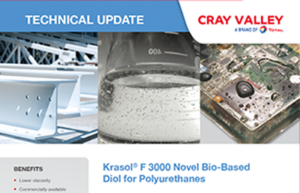Total Cray Valley industrializes sustainably sourced Krasol diols
Exton, PA – Total Cray Valley is expanding its hydroxyl-terminated diene resin portfolio with the industrial introduction of sustainably sourced farnesene-based resins, Krasol F3000 and Krasol F3100.
The Krasol product line is known in the market as a source of well-defined hydroxyl-terminated liquid poly(butadiene) diol and monol grades. These materials are used in a variety of end-use applications as components in urethane, epoxy and UV-cured adhesive and sealant formulations for the automotive and electronic markets. The diene backbone incorporates hydrophobic quality and chemical resistance, as well as elastomeric softness and low-temperature performance.
The introduction of farnesene as a new monomer complements these qualities while reducing the viscosity of the products, thanks to the unique “bottlebrush” backbone structure of the poly(farnesene) resin. The reduced viscosity of the resins allows for more latitude in formulation development and a unique balance of resulting properties.
Krasol F3000 (and Krasol F3100, the fully hydrogenated grade) are linear diols with near quantitative hydroxyl termination. Based on Amyris sustainable BioFene® monomer, the feedstock is 100% renewable carbon sourced. But the value of the technology is the combination of renewable content and performance.
“At the end of the day, we are able to produce value not just through sustainable sourcing of the feedstock, but by differentiating the product from other polymeric diols through unique structure/property relationships,” says Steve Henning, Total Cray Valley’s innovation manager.
The Krasol poly(farnesene) grades are now globally available in industrial quantities supplied by Total Cray Valley’s liquid poly(diene) plant in the Czech Republic. The availability of these grades is an excellent example of the development of materials for the future produced from bio-based feedstocks to meet a strong demand from our customers.

